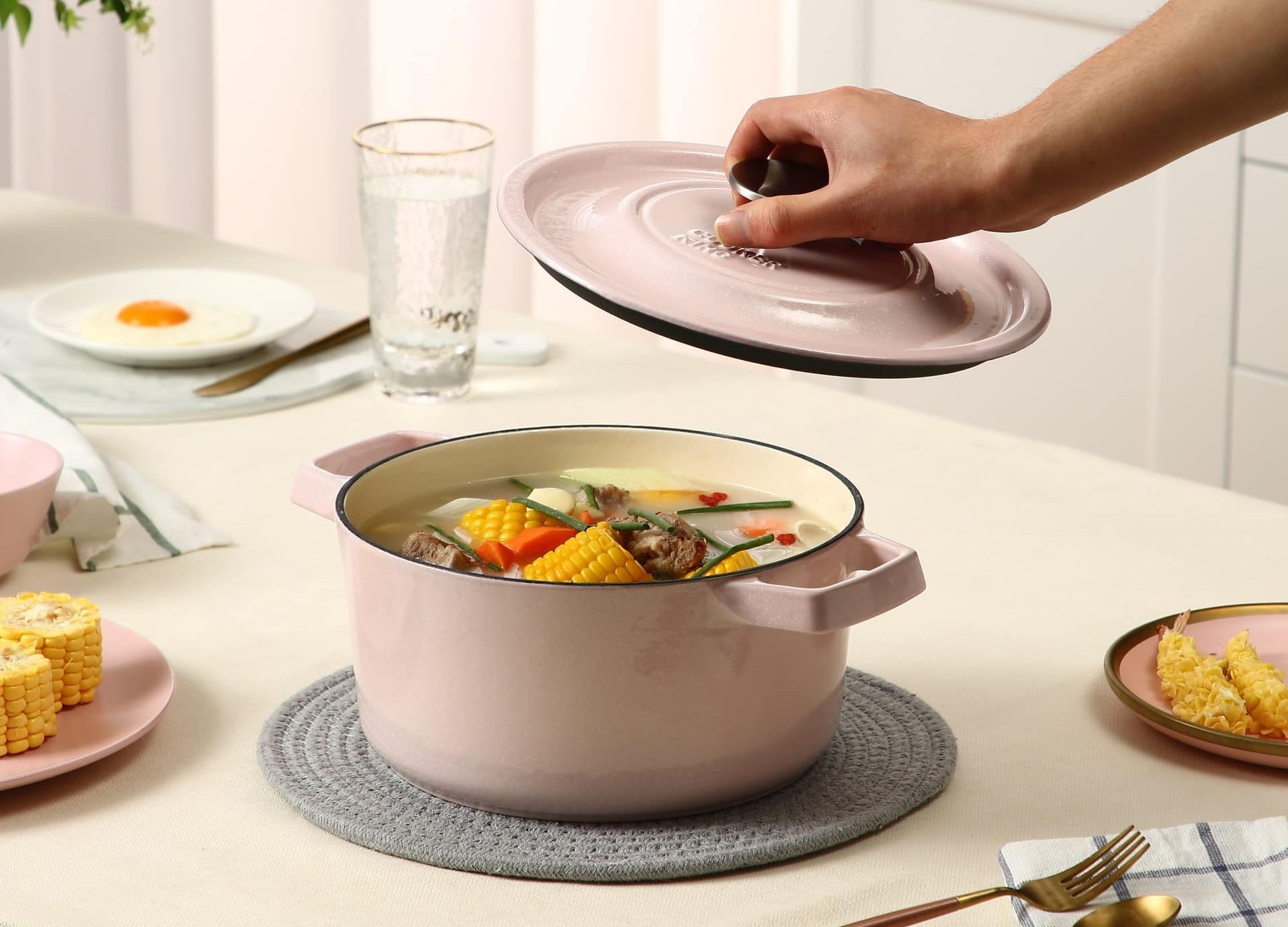An enameled cast-iron Dutch oven is a joy to work with (especially if it’s brand new). Frying in enameled cast iron also makes quick work of any recipe because the heat distribution can be better, and the surface is nonstick (like regular cast iron skillets). But what kinds of utensils are best suited for enameled cast iron cookware?
Can You Use Metal Utensils On Enameled Cast Iron?
An enameled cast-iron skillet should be treated just like any other cast iron cookware. However, many professional chefs err on using the more classical skillet because of the enameled version’s outer coating. Classic cast iron skillets are nonstick because of their seasoning. Essentially, there’s oil on the surface that allows food to be cooked easily, and they won’t stick. Regular use, moisture, and soap can peel away at the seasoning, and it’s important to season a cast-iron skillet again when the natural nonstick layer is gone.
There’s nothing wrong with using a metal spoon or kitchen utensil with a classic skillet because it’s unlikely that the metal utensil is hard enough to chip the skillet under normal use. But what if it’s enameled? From the experience of many home cooks and chefs worldwide, it would be best to steer clear of metal kitchen utensils because these might chip your enameled cookware. Treat your named cast iron skillet as you would your nonstick pans. This would lead us to several things. First, metal utensils are not ideal for nonstick pans and enameled skillets. Second, you should use kitchen utensils with softer materials, like wooden utensils and silicone utensils.
What about nylon and plastic utensils? Surely, these would be safe to use in the kitchen because they were designed to be kitchen utensils? Sadly, you will not get good results with nylon or plastic because they have lower heat resistance. Lower heat resistance means they will melt faster. Nylon has a higher heat resistance than plastic, and plastic has the lowest heat resistance of all the known materials used in kitchen cookware and utensils. So if you were to choose, in order, your top choice should be silicone kitchen utensils, followed by wooden utensils, and then nylon, before plastic. Avoid plastic altogether.
Plastic utensils will soften upon exposure to heat. Eventually, you will see the heads of these utensils shedding layers, flaking and turning to powder because of repeated exposure to heat.
There’s also the possibility that cheaper plastic utensils will be releasing toxins into your food, which isn’t a good thing at all. Be sure to keep those plastic utensils away from your food because they are usually poorly designed and they have no safeguards for melting and high temperatures while cooking.
Are Wooden or Silicone Utensils the Good Option to Cook With Enameled Cast Iron?
Hands down, the best cooking utensils for enameled cast iron are wooden cooking utensils and silicone cooking utensils. Cooking with enameled cast iron becomes super easy and worry-free when you are not constantly thinking that your utensils will be burning off their handles.
Wooden Cooking Utensils
- There’s a reason why so many people still use wooden utensils despite the availability of metal ones – wooden utensils have always been durable. Wooden utensils can’t even melt in the face of high cooking temperatures. The only way to break down wooden cooking utensils is by burning them directly with fire. But as for cooking temperatures, they won’t react to that at all. Think about that while remembering all the plastic spoons you wasted because you forgot to pull them out of the pot.
- Let’s talk about the safety of cooking utensils. Metal spoons and turners can get very hot – to the point that they can cause burns on your hand. If you are the type to leave turners and spoons in the pot or pan, wooden spoons might be your thing. Wood does not conduct heat. It can burn if there is fire involved, but it just stays cool no matter what. The part of a wooden utensil dipped in the cooking food might be hot, but only because liquids stick to it. The wood itself won’t conduct enough heat at all to cause pain to anyone.
- Do you ever wonder why wooden spoons are used for mixing salads? Wooden utensils are naturally non-reactive. This means that you can add just about any kind of acidic ingredient to a salad, and you will get zero reaction (chemically) from wooden utensils. If there are minute reactions, there won’t be any issues with the flavors, and certainly, nothing will change in the food itself.
- Since wooden spoons do not conduct heat, they won’t change the temperature of the food. Other types of utensils can cause big fluctuations in the food’s temperature, which can mess up your food.
Silicone Cooking Utensils
- Unlike plastic, silicone has much higher heat resistance. Despite having a flexible physical structure, silicone is not like plastic and will remain physically and chemically stable while you are cooking. There is a reason why bakeware is being manufactured from silicone now. They’re as safe as metal, and you can’t go wrong with food-grade silicone when you are baking dishes.
- Do you hate food stains on your cooking utensils? If so, it would be a great idea to shift to silicone utensils. Silicone utensils naturally deflect liquid stains, and they will remain awesome-looking for years to come. It’s a good time to invest in high-quality silicone utensils for your kitchen.
- And finally, silicone tools do not rust even with the presence of food acids and heat. So if you feel that these are not up to spec and won’t withstand the heat and food compounds, you are in for a great surprise.

